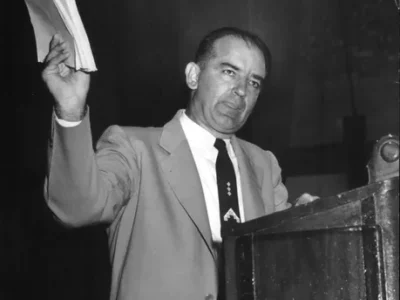When Republicans Fought for a Clean Environment
Environmentalism Used to Be a Bipartisan Issue
It is not unreasonable and overly rigid environmental regulations and restrictions that stand in the way of the expanded use of the nation’s coal reserves. It is the reluctance, and at times the refusal, to recognize the very serious health hazards and environmental, social and cultural impacts associated with a rapid rise in coal use.
These are the words of a Republican, Russell Train. Train served as the country’s second EPA administrator, after William Ruckelshaus, under Presidents Nixon and Ford. He spoke these words not to an environmental group, or to a friendly audience, but to the National Coal Association Conference and Expo in October of 1975.
I read Administrator Train’s words in the archives of EPA — doing research on a book I’m writing — on the day that the Trump Administration announced its replacement plan for the Clean Power Plan. This is the same plan that the Administration itself acknowledges will lead to 1400 premature deaths, cause 15,000 cases of new respiratory illnesses, intensify health consequences for those already suffering from respiratory ailments, and cost billions of dollars in increased sick days, missed school days, higher medical expenses, lost wages and other harms. As Sean pointed out in his post on the new rule, most of these deaths, health effects, and costs will hit people living in the midwest, east to Pennsylvania and in West Virginia. These are the states that helped put Trump into office.
In the current political climate, where the coal industry seems to have a direct hand in shaping EPA’s regulatory agenda, it’s hard to remember that Republican Administrators of EPA led the efforts to implement landmark statutes like the Clean Air Act and Clean Water Act. William Ruckelshaus not only served as our first Administrator under President Nixon but returned for another stint — appointed by President Reagan — in the wake of Anne Gorsuch’s disastrous turn at the head of the agency. I spent this week reading his speeches from both of his terms as Administrator.
Ruckelshaus’ commitment to environmental protection was unwavering and his speeches remarkable in expressing that commitment. One theme he repeated on several occasions was that the sole focus of EPA would be environmental protection. Unlike most other agencies, EPA would have no mission that involved protecting or promoting private industry. As he told the Annual Congress of Cities just days after taking the EPA helm:
We shall exercise [our] responsibilities as an independent agency, an agency that has no obligation to promote commerce or agriculture, but rather the awesome obligation to protect and improve our environment.
And several months later, he repeated the idea to the Indiana Bar Association:
No longer is the setting and enforcement of environmental quality standards in the hands of an agency which also has a promotional interest in the subject of regulation. EPA’s sole charge is to see that the standards it sets and enforces adequately protect the environment.
The contrast with an EPA that today might as well include “Coal” in its title could not be starker.
Administrator Ruckelshaus also believed that the U.S. — as the planet’s biggest polluter — had a responsibility to the rest of the world to provide environmental leadership and to develop technology that would clean up our environmental messes:
America does not face the environmental crisis alone. We are the most industrial nation in the world and thus the biggest polluter. Our leadership in pollution forces us to lead the world in its abatement. Not the kind of leadership which brings men in conflict with other men, but rather the kind of leadership which will bring men into harmony with nature. Other nations, the developed and the developing, look to America for guidance on how to deal with the environmental crisis. This is a challenge we dare not ignore and a trust we dare not fail.
Again, the contrast with the Trump Administration – and its decision to withdraw from the Paris Agreement, deny the existence of climate change, and decimate climate regulation – could not be clearer. Republicans of yore viewed the U.S. as a leader. The Trump Administration has, by contrast, isolated the U.S from the global community, leaving us the only country in the world not a signatory to the Paris Accord. We are ignoring the challenge Rucklshaus set forth and failing the world’s trust by doing so.
Ruckelshaus also stressed repeatedly that business bears responsibility for cleaning up the environment and that a healthy economy is an economy that protects the human health and the environment. He told the World Energy Conference that
Recently a critic asked whether we can have a rich, mobile, computerized, free society and at the same time enjoy an environment that is clean, safe, orderly and beautiful. My answer is yes, on one condition, that when we make our economic decisions we consider the entire system of earth, air, and water in which we live – its peoples, its resources, its limitations.
The Young Presidents Organization heard a similar message from him:
I don’t believe – any more than you do – that we have to make a choice between environmental quality and a healthy and vigorous economy. We are going to have both. Indeed, we must have both.…In a free society, our environmental, cultural, and social deficiencies are the problems of business as well as Government.
Russell Train (who gave far fewer speeches than his predecessor) went even further in criticizing big polluters. He pointed out
the paradox in our labels for people. We must ask ourselves who are the true conservatives, a term often linked with industry and business. Are they those members of industry who would foul the air so that asthmatics choke and plants wither, or those business executives who would accept and encourage controls on air pollution?
The environmentalist is far more realistic than those who would exploit this earth for short-term profit.
Ruckelshaus returned to head EPA in 1984 when Anne Gorsuch lost her post after decimating EPA’s budget, denigrating EPA career staff, reducing enforcement cases against polluters, cutting regulations, and mismanaging the Superfund program. Here’s what Administrator Ruckelshaus had to say about his role the second time around:
[Credibility] is … essential to an agency like EPA, which seeks to determine how much health or environmental protection the public should buy and at what price. …EPA, to function, must be credible.
This administration is quickly losing all credibility in what should be its mission, to protect the health of the American public and the environment. We shouldn’t forget, however, that Republicans haven’t always believed that environmental protection and economic growth are at war with one another, or that coal should be king no matter the consequences for those who breathe the air it pollutes. We shouldn’t forget that environmental protection once was a bipartisan issue, and we shouldn’t lose hope that some day it could be again.







Reader Comments